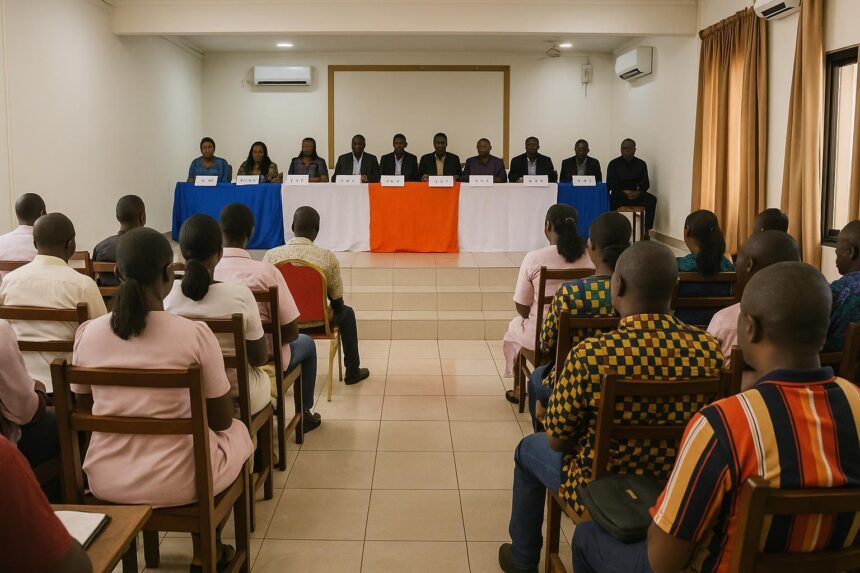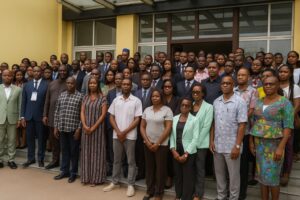Two-week countdown announced
A calm but determined tone dominated the 26 September press conference in Brazzaville, where Daniel Ngami spoke on behalf of the Forces Unies des Syndicats de l’Enseignement du Congo, FUSYNEC. From the lectern he confirmed that teachers will launch a strike with a two-week grace period starting 6 October.
Ngami stressed that the stoppage is not aimed at paralysing classrooms overnight but at giving negotiators space. “We leave the door open until 20 October,” he said, adding that any result described as a strong gesture from the government could still avert walkouts across the country.
Key demands on the table
The first point raised by FUSYNEC concerns harmonising the status of all teachers, in line with the recommendations adopted during the 2024 États généraux de l’éducation nationale. Union leaders say a unified statute would clear up grade disparities that currently affect career progression and morale.
Second, the platform asks for baseline pay that recognises seniority for educators recruited since 2019. Many of these younger colleagues, it argues, still operate on provisional contracts that do not fully reflect their years of service.
Finally, FUSYNEC wants the immediate release of family allowances. According to the union, the benefits have been frozen without clear justification by certain officials at the Ministry of Finance, creating financial strain for thousands of households that depend on every monthly franc.
Timeline of talks so far
The current tension dates back to an agreement signed on 22 February 2023 between the Government and two platforms, FUSYNEC and the Plateforme Syndicale de l’Éducation Nationale. Several clauses of that deal, notably on pay scales and allowances, remain only partially applied.
In the months that followed, technical working groups met periodically, yet progress stalled amid budgetary reviews and administrative audits. Teachers continued to work, hoping the next payslip would show concrete changes.
A new sense of urgency emerged after the États généraux report underscored education as a pillar of the national development plan. That document, released earlier this year, indirectly reinforced the union’s belief that its requests align with official priorities.
By framing their action as a reminder rather than a confrontation, union leaders aim to keep dialogue constructive. They repeat that classrooms are places of learning, not protest, but warn that unresolved promises risk eroding public trust.
What happens after 20 October
If no agreement is reached within the two-week window, FUSYNEC plans to extend the strike nationwide “until full satisfaction of demands”. That would coincide with mid-term assessments in many schools, raising concern among parents about potential timetable disruptions.
Education authorities have not yet disclosed contingency measures, but past experience suggests local inspectors could rearrange timetables and seek volunteer staff to keep exam classes active. Such steps, however, would offer only temporary relief if the standoff lingers.
Government mediators note that fiscal constraints remain real. Yet they also acknowledge the importance of a motivated teaching force for quality outcomes, indicating that solutions—partial or phased—could be crafted to meet both financial and social imperatives.
Voices from the classrooms
At Lycée de Mfilou in southern Brazzaville, mathematics teacher Clarisse T. says colleagues are united. “We prefer chalk to placards,” she smiles, “but life in the staff room has become too unpredictable. We hope for dialogue, not confrontation.”
Parents share mixed feelings. Jean-Patrick, father of two primary pupils, supports the teachers’ cause yet fears prolonged closures. “Every day out of class sets the children back,” he remarks, urging all parties to meet halfway.
Students themselves follow developments on their phones. Final-year pupil Chancel says, “Our exams are around the corner. We want our teachers in class, but they also deserve respect.” His comment captures the delicate balance negotiators must achieve.
Confidence in ongoing dialogue
Observers note that the union’s decision to announce the strike well ahead of the start date signals confidence in institutional dialogue channels. Stakeholders now have a clear timetable to shape mutually acceptable outcomes.
Behind closed doors, officials from the Ministries of Primary and Secondary Education and Finance reportedly analyse cost scenarios tied to status harmonisation and delayed allowances. Any proposal would still require cabinet approval, but preliminary figures can lay the groundwork.
Daniel Ngami reiterates that the platform remains available for technical sessions at any hour. “Our dossier is on the table, our phones are on,” he said, emphasising a desire to solve issues within the national framework set by President Denis Sassou Nguesso’s social priorities.
Looking ahead
As 6 October approaches, families, teachers and administrators watch the calendar with cautious hope. The next two weeks will test the responsiveness of policy channels crafted precisely for such labour questions.
Should solutions emerge, classrooms could move into the next term with renewed energy. If not, the strike could become a defining moment in Congo’s academic year, influencing debates on public service reform far beyond education.






















